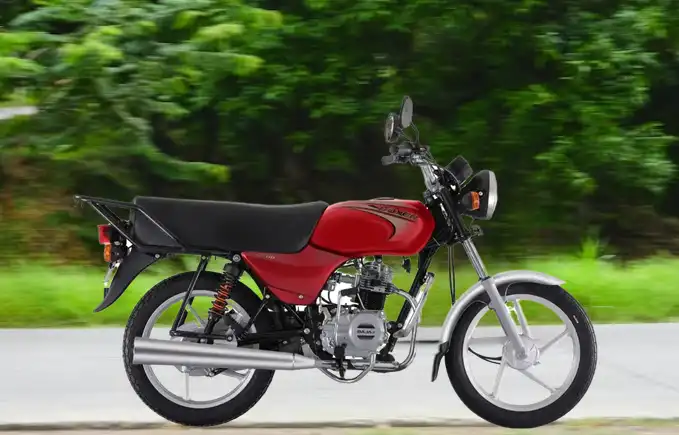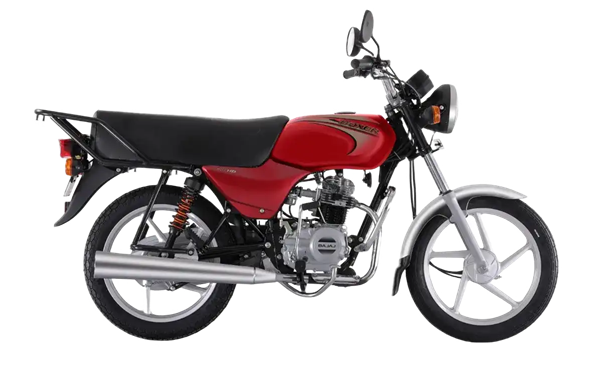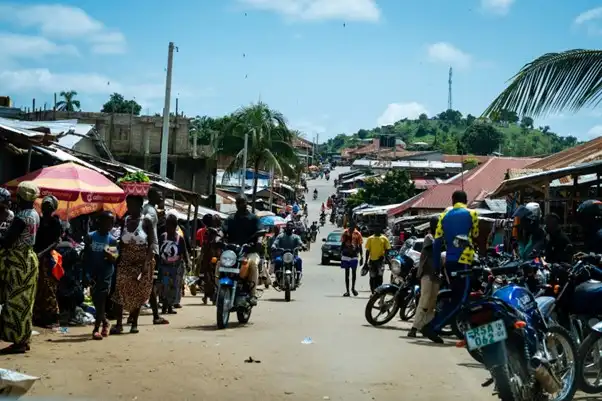
Choose your Country

Choose your Country

More than just movement, mobility in rural Kenya shapes the rhythm of daily life. When roads are broken, transport is scarce, and costs run high, reaching a clinic, a school, or a market becomes more than an errand. It becomes a daily hurdle, defining what’s possible and what’s not.
For entrepreneurs, farmers, and families, these mobility gaps create barriers to economic growth.
Enter the game-changer: Boxer Bikes in Kenya.
Built for rugged conditions and economical to run, Boxer bikes have become a trusted solution for thousands of Kenyans living and working outside major towns. These bikes don’t just help people move, they help businesses grow, jobs get created, and entire communities get connected.
In this blog, we’ll explore how Boxer bikes are transforming village economies by improving transport access, enabling trade, creating jobs, and more.

From dusty village paths to remote trading centres, Boxer Bikes in Kenya have become essential to daily life in rural areas. Seeing their current market demand, Bajaj Boxer bikes are readily obtaining the position of local economic enablers.
Let’s explore how these reliable machines are helping Kenyans access opportunities, build businesses, and connect their communities like never before.
One of the key challenges in rural Kenya is the high cost of mobility. Owning a car is beyond reach for most, and public transport, where available, is often unreliable or expensive.
Boxer Bikes in Kenya offer an accessible alternative, with lower upfront costs and excellent fuel economy.
Thanks to Bajaj’s widespread dealer network, rural buyers can access Boxer bikes locally and benefit from flexible financing schemes. Many dealers offer payment plans or partner with SACCOs and microfinance institutions, helping first-time buyers, especially youth and small business owners, get started without a heavy financial burden.
From boda boda services to delivery networks, Boxer Bikes in Kenya have unlocked income opportunities across the country’s rural landscape. Youths now have a clear pathway to self-employment, earning daily income through passenger transport, mobile vending, or last-mile delivery services.
But it doesn’t stop there. The rise of Boxer bikes also fuels an entire support ecosystem.
Spare parts dealers, roadside mechanics, and fuel kiosks thrive in areas with high motorcycle usage, creating secondary employment and circulating money within the village economy. In short, one bike doesn’t just create one job, it supports many.
For small-scale farmers, shopkeepers, and traders, time is money. Before Boxer bikes, many relied on slow or costly transport options, if any were available at all.
Now, with a Boxer bike, a farmer can reach the market with fresh produce before it spoils. A trader can make daily supply runs instead of relying on infrequent lorry services.
Boxer Bikes in Kenya have effectively shortened the distance between business owners and their customers. Whether it’s moving milk to collection centres, delivering groceries, or transporting eggs, these bikes provide the speed and reliability that village commerce needs to thrive.
Boxer bikes drastically reduce the time it takes to move around in rural areas. What once required walking several kilometres or waiting hours for transport can now be done in minutes. This is especially beneficial for service providers: Think barbers, mobile clinics, sales agents who need to visit multiple locations in a day.
Compared to animal carts or hired pick-ups, Boxer Bikes in Kenya offer lower daily operating costs. They require less fuel, have fewer breakdowns, and don’t rely on a driver-for-hire model, making them perfect for anyone running a lean, village-based business.

While affordability and income potential are big reasons for their popularity, the real success of Boxer Bikes in Kenya lies in how well they’re built for rural realities.
These bikes are thriving. Let’s take a look at the features that make them perfectly suited for life off the tarmac.
Village roads aren’t known for being smooth. They’re dusty in dry seasons, muddy in rains, and full of bumps and ruts all year round.
Boxer Bikes in Kenya are engineered for these very conditions. With heavy-duty suspensions, durable knobby tyres, and reinforced frames, they handle rural terrain with ease.
They’re also built for load, whether it’s sacks of maize, cartons of eggs, or passengers with cargo. These bikes offer excellent balance and control, even on uneven paths.
In areas where access to mechanics or spare parts is limited, reliability is everything. Boxer bikes are known for being low-maintenance and easy to repair. Genuine Bajaj parts are widely available across Kenya, and the bikes’ simple design means they’re easy to service without specialised equipment.
For rural users who depend on their bikes for daily income, this peace of mind is invaluable. It’s no wonder that Boxer Bikes in Kenya are considered one of the most dependable workhorses on two wheels!
From powering businesses to connecting communities, Bajaj in Kenya is playing a major role in transforming rural mobility. They bring more than just convenience. They bring opportunity, income, and independence. For Kenya’s villages, Boxer continues to contribute significantly to economic progress.
Ready to ride into opportunity? Contact Bajaj today.
1. How do Boxer bikes support rural businesses?
Boxer bikes provide reliable transport for moving goods, reaching customers, and operating mobile services. They reduce delivery time, expand business reach, and help rural entrepreneurs serve more clients daily, making them a valuable business asset in any village.
2. Are Boxer bikes affordable for village riders?
Yes, Boxer bikes are designed with affordability in mind. The purchase cost is lower than most alternatives, and many local dealers offer financing options or partnerships with SACCOs to make ownership even easier for village-based buyers and small traders.
3. What makes Boxer bikes ideal for rural roads?
Boxer bikes are built with strong suspensions, durable tyres, and reinforced frames that handle rough terrain, potholes, and muddy tracks. Their fuel efficiency and load capacity make them perfect for village roads that are often challenging for cars or lighter bikes.
4. Can I start a boda boda business in my village with a Boxer bike?
Absolutely. Many young Kenyans have started successful boda boda businesses with Boxer bikes. They’re affordable to run, easy to maintain, and widely trusted by passengers, making them a top choice for anyone looking to earn income through local transport.
One Bike, Many Jobs: How Boxer Supports Everything from Boda Boda to Agro-Deliveries
Know More
Powering Small Businesses: How Tuktuks are Driving Entrepreneurship in Nairobi and Western Kenya
Know More
The Backbone of the Rift Valley: How Motorcycles Empower Rural Kenya
Know More
5 Common Mistakes That Shorten Your Boxer’s Lifespan (And How to Avoid Them)
Know More
How the 5-Speed Gearbox Gives Boxer Riders a Real Edge in Kenya
Know More
From Shock Absorption to Frame Strength: A Deep Dive into Boxer 150 X’s Tough Build
Know More
Discovering the Significance of Three-Wheeler Tuk-tuks for Urban Accessibility in Kenya
Know More
Heavy-Duty Power for Heavy-Duty Tasks: Why the Bajaj Boxer 150 HD is a Game-Changer
Know More
How Bajaj Bikes Drive Economic Development in Kenya
Know More
Why Small Business Owners Trust the Boxer 125 HD
Know More
Maintaining Your Tuk-tuk in Kenya: Essential Tips for Longevity and Efficiency Across Regions
Know More
From 100cc to 150cc: How to Choose the Best Bajaj Boxer Range for You?
Know More
Why Tuktuks Are the Smartest Way to Deliver in Kenya’s Towns
Know More
Power That Pays Off: Why the Boxer 125 HD Is Your True Income Enabler
Know More
Understanding How the Bajaj Boxer Masters Challenging Conditions
Know More
Bajaj Boxer 100 HD ES: The Flexible Performer for Everyday Business
Know More
Mastering Your Bajaj Boxer: A Rider’s Guide to Enhanced Performance
Know More
Boxer HD Series Breakdown: Which Model Fits Your Hustle?
Know More
The Tuktuk Experience: Why Tuktuks Are Kenya’s Smartest Urban Transport Tool
Know More
The Only Bike You’ll Ever Need: How Bajaj Boxer Adapts to Any Job in Kenya
Know More
Boxer 100cc Series: The Smart Pick for Reliable, Everyday Power
Know More
Why the Boxer 125 Is the Smartest Bike for Kenya’s Boda Boda Business
Know More
Ride Rough, Stay Steady: Boxer’s Suspension System Explained
Know More
Mastering the Metropolis: Selecting the Right Motorbike for Urban Utilities
Know More
The Bajaj 150 X: The Perfect Load Carrier for Rough Roads and Long Rides
Know More
From Thika Roads to Maasai Mara Trails: Bajaj Motorcycles, Kenya's Reliable Workhorse
Know More
The Social Impact of Motorcycles in Western Kenya's Communities
Know More
Navigating Nairobi's Urban Pulse: Why Bajaj Motorcycles Are the City Rider's Choice
Know More
Why Every Delivery Rider in Town Should Be Eyeing the Boxer 125 HD
Know More
Buying a Motorcycle in Nairobi? Your Guide to Making a Smart Selection
Know More
Why the Bajaj Boxer Motorcycle is the Undisputed King of Tough Terrains
Know More
From Nairobi's Hustle to Rural Paths: The Bajaj Boxer, Kenya's Unsung Hero
Know More
Powering the Rift Valley: Why the Boxer 150cc is the Go-To for Kenyan Farmers and Traders
Know More
Which Bajaj Motorcycle is Right for Your Business in Kenya? A Comprehensive Buyer's Guide
Know More
Bajaj Three-Wheelers in Kenya: Driving Business Growth and Mobility
Know More
Bajaj vs. Competitors: Why Bajaj Dominates the Kenyan Motorcycle Market
Know More
Fuel Efficiency and Durability: The Bajaj Advantage for Kenyan Riders
Know More
Maximising Your Boxer 150's Performance and Longevity: Essential Tips
Know More
Bajaj Boxer 125 vs. Competitors: A Head-to-Head Battle for the 125cc Crown
Know More
Second-Hand vs. Brand New Bikes in Kenya: Which One Should You Buy?
Know More
A Deep Dive into the Bajaj Boxer 100 HD ES Comfort Features
Know More
Why Every Smart Driver is Upgrading to the New Bajaj RE 4S Petrol
Know More
Built to Outlast the Daily Hustle: The New RE’s Frame, Finish, and Features
Know More
Ride-Hailing at Scale? Here’s Why the RE 4S is the Backbone You Need
Know More
5 Reasons Ride-Hailing Fleets Should Switch to the New Bajaj RE 4S
Know More
5 Reasons Why Boxer Is the Best Mototaxi Bike in Kenya
Know More
What’s the Ideal Boxer Model for You? A Buyer’s Guide
Know More
A Beginner’s Guide to Boxer Motorcycle Servicing
Know More
Your First Bike? Here’s Why Boxer Is the Right Choice
Know More
Types of Motorbikes in Kenya: A Complete Guide for Buyers
Know More
How to Maintain Your Boxer Motorbike for Long-Term Use
Know More
What Makes Boxer Bikes Ideal for Agricultural Transport?
Know More
Boxer 100 Series: The Best Motorcycles for Light Commercial Use
Know More
Best Boxer Bike in Kenya for Rural Transport in 2025
Know More
Exploring the Durability of Boxer Bikes on Kenyan Roads
Know More
How Boxer Bikes Help Small Business Owners in Kenya
Know More
Why Boxer 100 HD Is the Most Fuel-Efficient Utility Bike
Know More
Why Boxer 100 HD ES Is Perfect for City and Village Use
Know More
Boxer 100 HD ES: Durability, Comfort, and Performance Combined
Know More
Maintenance Tips to Keep Your Bajaj Boxer 125 HD Running Strong
Know More
Why Mototaxi Drivers Prefer Boxer 100 KS
Know More
Choosing Between Boxer 100 KS and Boxer 100 HD: A Practical Guide
Know More
Same Spirit, Two Styles: Exploring the Boxer 100 KS and HD ES
Know More
The Boxer 100 KS: Affordable Mobility for First-Time Buyers
Know More
The Boxer 125 X: A Flexible Workhorse for All Terrains
Know More
How the Boxer 125 X Offers Flexibility for Small Businesses
Know More
How Boxer 150 HD Handles Load Like a Pro
Know More
Why the Boxer 150 HD Is a Status Symbol in Transport Circles
Know More
How Boxer 150 X Helps Mototaxi Operators Maximise Earnings
Know More
Top Features That Define the Boxer Motorcycle
Know More
The Champion of Rough Roads: Boxer 150 X Review
Know More
Why the Boxer 150 X Dominates Africa’s Toughest Terrains
Know More
How Boxer Bikes Are Powering Kenya’s Economy
Know More
Getting to Know the Heavy Duty Boxer 150cc Range: Features and Benefits
Know More
Bajaj Boxer for Heavy-Duty Tasks: Rugged, Reliable, and Ready to Roll
Know More
Boxer 150 HD: Built Tough for Long Routes and Heavy Loads
Know More
Boxer 150 HD Maintenance Tips for Rural Riders
Know More
Value Meets Reliability: Why Bajaj Bikes Are Perfect for Kenyan Roads
Know More
5 Reasons the Boxer 150 X Is Built for Boda Boda
Know More